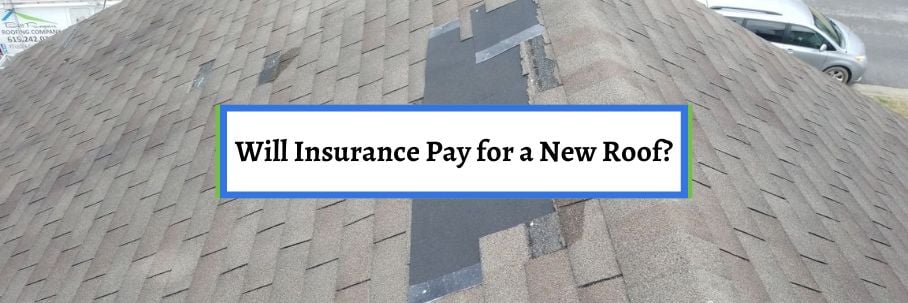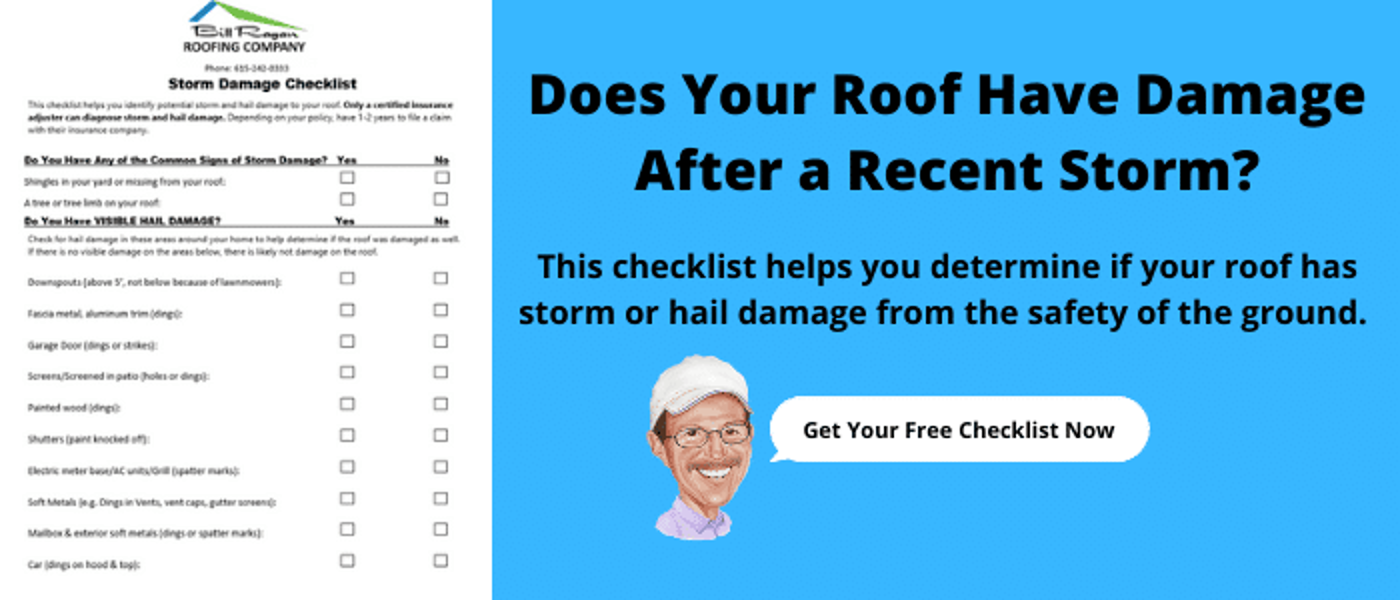Will Insurance Pay for a New Roof?

You have homeowners insurance to protect your home from damage and other unforeseen problems. This includes covering your roof if it’s ever damaged.
But will your insurance company pay for a new roof? That comes down to what caused the damage and the type of policy you have.
For over 30 years, the team at Bill Ragan Roofing has guided and helped homeowners through the insurance claim process for roof damage. Because of this, I’ll help you get started by helping you understand if insurance will pay for your new roof and more.
This article answers the following questions:
- Will insurance pay for a new roof?
- How does your insurance policy impact if insurance pays for a new roof?
- Do you have to pay your deductible?
- What happens if your insurance company doesn’t give you enough money?
Will insurance pay for a new roof?
Yes, insurance will pay for a new roof under the right circumstances. To get a roof replacement from your insurance company, your roof must have damage caused by extreme weather during storms.
 (Left: hail damage; Right: wind damage)
(Left: hail damage; Right: wind damage)
These weather events include straight-line winds (aka damaging winds) during heavy thunderstorms ripping off shingles, hail storms, snowstorms, and tornados. They’ll also cover damage from trees or tree limbs falling on your roof during a storm.
If you have roof damage caused by any of the above, your insurance should pay for all or almost all of your roof replacement. But it all comes down to what the insurance adjuster finds during their roof inspection.
They have all the power and are the only one who can determine if your roof is worthy of a full replacement. But as long as the damage is caused by a storm, you’ll get a payout from your insurance company.
How does your insurance policy affect if insurance pays for a new roof?
Now you know that insurance will pay for a new roof in the event of storm damage. But did you know how much money you get from the insurance company depends on your policy?
You’ll have one of two insurance policies: Actual Cash Value or Replace Cost Value. Each equals a payout from the insurance company, but the amount is very different.
Actual Cash Value policy
An Actual Cash Value (ACV) policy only gives you the depreciated value of your roof as it stands at the time of the claim. This policy only ensures the insurance company gives you what your roof is valued at today.
Unfortunately, you won’t get enough to cover the cost of a full roof replacement. You’ll use the depreciated amount you get from insurance and pay out-of-pocket to make up the difference.
It can be tempting to try to find a roofing contractor who will do it for the amount your ACV policy gives. However, this guarantees you’ll get the cheapest materials and labor available.
But a cheap roof equals cheaper quality and labor, which sets your roof investment up for premature failure from the beginning.
Replacement Cost Value policy
A Replacement Cost Value (RCV) policy gives you what it costs to replace your roof with a brand-new version of itself. This policy means your insurance company is supposed to give you enough to cover a full roof replacement.
You’ll first get a check for the actual cost value of your roof while your insurance company holds back recoverable depreciation. After the job is complete and you provide proof that it was done per the insurance claim, your insurance company sends a second check that covers most or the rest of the cost.
Remember, your insurance company only pays to restore your new roof to a brand-new version of itself. If you want to add upgrades to certain areas, like going from 3-tab asphalt shingles to architectural asphalt shingles, you’ll cover the difference out of pocket.
Just know that insurance companies rarely give you enough for a full roof replacement, even with an RCV policy. But just know that you do have options (more on that in a minute).
Do you have to pay your deductible when insurance pays for a new roof?
One of the biggest pieces of misinformation when it comes to insurance and roofing revolves around paying deductibles. No matter what you hear, read, or what a roofing company says, you must pay your deductible when your claim is approved for a roof replacement.
You’ll hear about some roofing companies paying deductibles, but this is illegal. Not only is it illegal, but it is outright committing fraud.
And guess which one will have to deal with the repercussions. Unfortunately, some homeowners jump at the opportunity when a roofing company is willing to pay their deductible.
I understand it’s tempting to save money where you can, but having a roofing company pay your deductible is not worth committing fraud. This is one of the biggest scams in the roofing industry, and you should NEVER EVER entertain the idea of a roofer paying your deductible.
What happens if your insurance estimate is lower than your roofing contractor’s estimate?
As I said, insurance companies don’t always give you enough to cover the cost of a full roof replacement. This is due to insurance companies leaving off crucial line items, labor costs, overhead, and other things a roofing contractor needs to do the job right and be profitable.
If this happens, there’s no reason to panic. You have a few different options if the insurance company doesn’t give you enough money to cover a full roof replacement.
The first option is putting in the time and energy to supplement your claim. This ultimately falls on you to put in the time and work to get every single line item covered.
A reputable roofing contractor will provide tools and/or verbiage to help you do this. Speaking from 30 years of experience working on insurance claims, insurance companies listen to policy owners way better than they listen to roofing companies.
If you don’t want to deal with supplementing (which is understandable), the next option is using the money insurance to pay for as much as possible and make up the difference out of pocket. Even though insurance doesn’t cover the full amount, you’ll still get a large portion covered.
The last option is to finance your roof replacement and make payments like a car loan. This option lets you do what you want with the insurance money while making monthly payments.
Remember, you’ll have to pay your deductible no matter what. So, it’s important to pick the option that works for your situation and budget.
What do you need to know about the insurance claim process?
Now you know insurance will pay for a new roof, how your policy impacts the payout, that you must pay your deductible, and your options if your insurance estimate is too low. After reading this article, you should have a good idea if you should file and what to expect when filing an insurance claim.
Unfortunately, the insurance claim process is confusing and full of misconceptions. This is especially true for homeowners who have never had to deal with homeowners insurance.
The last thing you want is to go into the process unprepared. So, before actually filing a claim, you need to know what to expect.
That’s why I wrote another article that breaks down what every homeowner needs to keep in mind when filing an insurance claim for roof damage.
Check out 7 Things You Need to Know About the Insurance Process for Roof Damage, so you’re fully prepared and know what to expect when filing an insurance claim.


